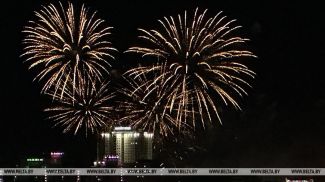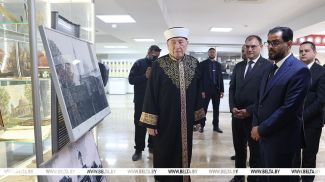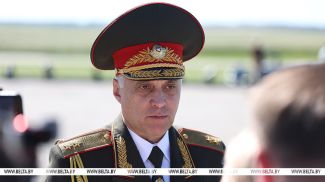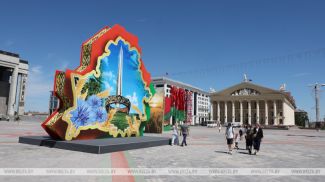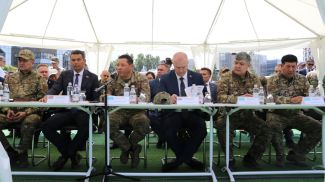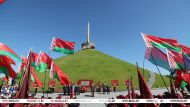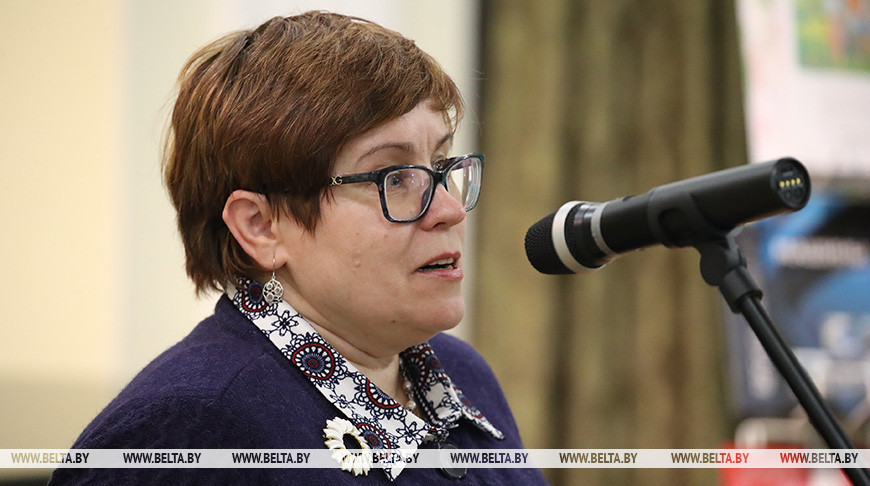
An archive photo
MINSK, 20 March (BelTA) – Belarus sticks to its human rights commitments and confirms its readiness to interact with UN member states, the human rights system and its mechanisms on the principles of respect for sovereignty, impartiality and universality, Permanent Representative of Belarus to the UN Office in Geneva Larisa Belskaya said at the 55th session of the UN Human Rights Council that discussed the report of the UN High Commissioner for Human Rights on the situation of human rights in Belarus, BelTA has learned.
“The so-called ‘group of experts’ of OHCHR [the Office of the United Nations High Commissioner for Human Rights] that disseminates disinformation about the 2020 presidential election in Belarus and the subsequent situation in its biased reports is an instrument of pressure and it does not adhere to its principles. Belarus does not recognize such mandates. The sources of anonymous ‘first-hand interviews’ cited by the report are likely to be ‘activists’ who fled the country after failing to undermine the Belarusian state through an attempted color revolution and through participation in illegal anti-government actions and clashes with law enforcement. Now they are making extremist calls and announcing plans from abroad to overthrow the legitimate government, and are ready to do it even through an armed conflict in Belarus,” the Belarusian diplomat said.
Larisa Belskaya noted that “these personalities” do not represent Belarus or its people, neither de facto, nor de jure. Attempts by Western governments to portray them as ‘leaders’ of democratic forces represent a malicious distortion of the principles of international law and the UN Charter. Such a distortion seeks to legitimize activities against the sovereign Belarusian state and to validate interference in its internal affairs.
“Puppet structures, fully financed by Western taxpayers, are doing whatever it takes to secure their funding and the status of supposedly ‘political opponents’ of the Belarusian authorities. This ranges from disinformation to calls for expanding Western sanctions against Belarus. The report, based on such sources, deliberately distorts the real situation in the country and ignores any alternative points of view,” the permanent representative of Belarus emphasized.
She noted that the legitimate actions of law enforcement agencies to contain riots prepared in advance and financed from abroad, to detain their initiators and active participants, as well as fair sentences handed down by Belarusian courts to perpetrators, are groundlessly misrepresented as oppression. At the same time, similar actions of law enforcement in Western countries are presented as attempts to protect order and democracy. “What is this if not hypocrisy?!” the diplomat asked.
According to Larisa Belskaya, the absurdity of accusing the Belarusian authorities of possible “crimes against humanity” and the policy of double standards of Western countries are especially apparent against the backdrop of their hypocritical and cynical assessments of armed conflicts supported by the West.
“There are no political prisoners in Belarus. Persons serving sentences are convicted of specific crimes, including crimes against national security. In Belarus, all wrongdoers are treated equally, including those who are favored by foreign politicians or act in their interests,” she emphasized.
According to Larisa Belskaya, it is very telling that for the authors of the report and Western delegations to the Human Rights Council, the key criterion for assessing the independence and democracy of Belarusian political parties, trade unions, NGOs or mass media is whether or not they have an anti-government position and carry out anti-government activities. “Everyone else is dismissed as dependent and non-democratic. And this is an almost four-million-strong trade union movement, patriotic political parties, hundreds of NGOs constructively interacting with the government in all areas of public life,” the diplomat noted.
She emphasized that the report is an example of how the HRC mechanisms are used to help a number of Western countries instrumentalize human rights in order to destabilize countries, to encourage actions against legitimate governments and to distort information about such actions. “Under the slogan of the universality of human rights, a strategy is being implemented to change government systems chosen by the people or to weaken governments that follow their own path of development instead of doing the West’s bidding. This strategy stems from disrespect for sovereign states and disregard for the price that developing nations pay for Western experiments to instigate color revolutions and to impose the so-called “rules-based order,” said the permanent representative of Belarus.
In conclusion, Larisa Belskaya emphasized: “The real situation in Belarus is a far cry from the false picture painted by the report. The country is developing successfully despite large-scale Western sanctions.” Thus, in the atmosphere of a national dialogue, with the support of the overwhelming majority of citizens, constitutional reform has been implemented, the political system is being updated, all branches of power are being reformed, parliamentary and local elections have been held, and civil society is actively developing.
“The key goals of Belarus’ government policy that will remain unchanged are to improve the well-being of people, protect the interests of the Belarusian state and the rights of Belarusian citizens, including the right to independent, evolutionary and peaceful development,” the Belarusian diplomat concluded.
“The so-called ‘group of experts’ of OHCHR [the Office of the United Nations High Commissioner for Human Rights] that disseminates disinformation about the 2020 presidential election in Belarus and the subsequent situation in its biased reports is an instrument of pressure and it does not adhere to its principles. Belarus does not recognize such mandates. The sources of anonymous ‘first-hand interviews’ cited by the report are likely to be ‘activists’ who fled the country after failing to undermine the Belarusian state through an attempted color revolution and through participation in illegal anti-government actions and clashes with law enforcement. Now they are making extremist calls and announcing plans from abroad to overthrow the legitimate government, and are ready to do it even through an armed conflict in Belarus,” the Belarusian diplomat said.
Larisa Belskaya noted that “these personalities” do not represent Belarus or its people, neither de facto, nor de jure. Attempts by Western governments to portray them as ‘leaders’ of democratic forces represent a malicious distortion of the principles of international law and the UN Charter. Such a distortion seeks to legitimize activities against the sovereign Belarusian state and to validate interference in its internal affairs.
“Puppet structures, fully financed by Western taxpayers, are doing whatever it takes to secure their funding and the status of supposedly ‘political opponents’ of the Belarusian authorities. This ranges from disinformation to calls for expanding Western sanctions against Belarus. The report, based on such sources, deliberately distorts the real situation in the country and ignores any alternative points of view,” the permanent representative of Belarus emphasized.
She noted that the legitimate actions of law enforcement agencies to contain riots prepared in advance and financed from abroad, to detain their initiators and active participants, as well as fair sentences handed down by Belarusian courts to perpetrators, are groundlessly misrepresented as oppression. At the same time, similar actions of law enforcement in Western countries are presented as attempts to protect order and democracy. “What is this if not hypocrisy?!” the diplomat asked.
According to Larisa Belskaya, the absurdity of accusing the Belarusian authorities of possible “crimes against humanity” and the policy of double standards of Western countries are especially apparent against the backdrop of their hypocritical and cynical assessments of armed conflicts supported by the West.
“There are no political prisoners in Belarus. Persons serving sentences are convicted of specific crimes, including crimes against national security. In Belarus, all wrongdoers are treated equally, including those who are favored by foreign politicians or act in their interests,” she emphasized.
According to Larisa Belskaya, it is very telling that for the authors of the report and Western delegations to the Human Rights Council, the key criterion for assessing the independence and democracy of Belarusian political parties, trade unions, NGOs or mass media is whether or not they have an anti-government position and carry out anti-government activities. “Everyone else is dismissed as dependent and non-democratic. And this is an almost four-million-strong trade union movement, patriotic political parties, hundreds of NGOs constructively interacting with the government in all areas of public life,” the diplomat noted.
She emphasized that the report is an example of how the HRC mechanisms are used to help a number of Western countries instrumentalize human rights in order to destabilize countries, to encourage actions against legitimate governments and to distort information about such actions. “Under the slogan of the universality of human rights, a strategy is being implemented to change government systems chosen by the people or to weaken governments that follow their own path of development instead of doing the West’s bidding. This strategy stems from disrespect for sovereign states and disregard for the price that developing nations pay for Western experiments to instigate color revolutions and to impose the so-called “rules-based order,” said the permanent representative of Belarus.
In conclusion, Larisa Belskaya emphasized: “The real situation in Belarus is a far cry from the false picture painted by the report. The country is developing successfully despite large-scale Western sanctions.” Thus, in the atmosphere of a national dialogue, with the support of the overwhelming majority of citizens, constitutional reform has been implemented, the political system is being updated, all branches of power are being reformed, parliamentary and local elections have been held, and civil society is actively developing.
“The key goals of Belarus’ government policy that will remain unchanged are to improve the well-being of people, protect the interests of the Belarusian state and the rights of Belarusian citizens, including the right to independent, evolutionary and peaceful development,” the Belarusian diplomat concluded.




